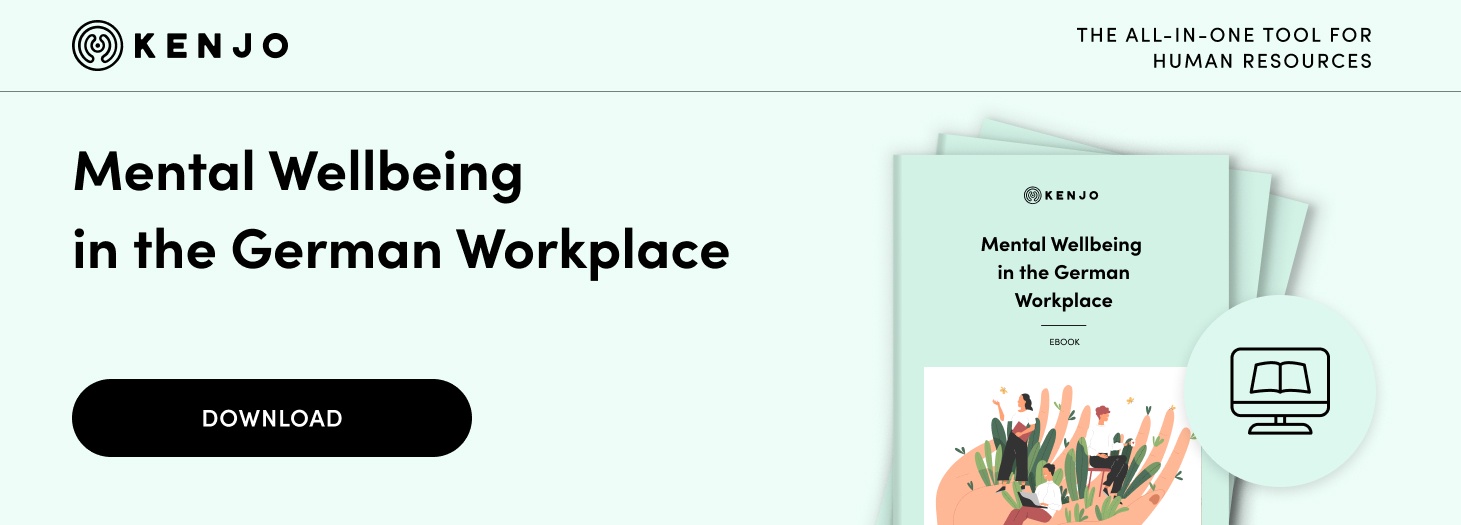Workplace stress and burnout: How HR can protect their employees

Daria Kyrilova is a Talent Consultant, Coach & Mental Health Advocate who has worked with many tech companies of different stages. In this article, she shares the most common warning signs of workplace stress and overwhelm and actionable advice for supporting overwhelmed employees on the individual and organisational levels.
Stress: a normal response to abnormal situations
Irrespective of our backgrounds, job titles or salaries, our bodies work the same way: when our nervous system detects a change (or “stressor”) in our environment that may potentially threaten our well-being, it activates a stress response. Stress is not only normal, it’s essential to our health and survival — like an alarm bell that sounds whenever we need to take extra care of ourselves.
Stressors come in all shapes and sizes. Some are real — like getting fired, others are perceived — like thinking you might get fired. Some are internal — like feeling anxious about a performance review, others are external — like having to lay off an employee. Some are minor — like incoming emails, others are major — like a company declaring bankruptcy.
Part 1: COVID-19 and mental health
The COVID-19 pandemic has brought about unprecedented levels of change to our environment and impacted virtually every aspect of our society, economy and daily life — unleashing stressors of all kinds. The more stressors we experience, the more strained our nervous system becomes and the more our mental health may suffer as a result.
The President of the UK’s Royal College of Psychiatrists recently stated that COVID-19 poses the greatest threat to mental health since World War II. It’s hardly surprising that many of the hallmark experiences of the pandemic — blurred (or absent) personal and professional boundaries, heavy workloads, physical and emotional fatigue, lack of social support, feelings of powerlessness or lack of control — are known risk factors for burnout and other mental health conditions.
How can we recognise when someone is psychologically overwhelmed?
Because stress strains and dysregulates our nervous system, the perception, capacity and internal experience of a person enduring prolonged periods of uncertainty, instability and overwhelm can change significantly when compared to their baseline, regulated state.
The impact of stress and overwhelm can show up in many ways. Some stress responses may be mild — like increased irritability; others are considered more severe — like anxiety attacks. Some, like workaholism, might be praised and rewarded in certain work cultures; others, like sudden outbursts of emotion, might be stigmatised and labelled “unprofessional.”
Changes in an employee's behaviour — whether mild or severe, sudden or gradual — may indicate psychological overwhelm and a need for support. Potential warning signs can be harder to spot remotely — and harder still over email or chat communication, as it lacks important contextual cues such as tone of voice, facial expressions and body language.
Promptly and empathetically checking in after noticing changes in a person’s behaviour, work output, focus or communication, can help get on the same page and avoid misunderstandings or misinterpretations.
Common signs and stress responses to watch out for
The sections below outline some common stress responses in the workplace that may be related to psychological overwhelm. People’s experience varies — some individuals may show various signs, others may show few or none at all. The root causes are also likely to differ — they may be stress-related for some, or involve other underlying reasons or conditions for others.
(It’s important to think of the points below as prompts for inquiry and support, not judgement or diagnosis — the latter should only be done by a qualified mental health professional.)
Irrespective of the root cause, inviting the employee to discuss their state of well-being in a safe environment without judgement or the risk of retribution is a good first step.
CONTROL / WORK HARDER
A common strategy for dealing with things we can’t control is to focus on things we can control, which is why many of us use work as a means of escaping stress or powerlessness in other areas of life. When left unchecked, this can evolve into “panic working” or “toxic productivity” that disconnects us from our needs, relationships, perspectives and sense of self-efficacy, putting us on the fast track to burnout. As organisational psychologist Gianpiero Petriglieri puts it, “eventually, we fall apart because we have tried too hard to keep ourselves together.”
Notice if a colleague:
- Consistently works long hours and/or skips breaks, even when their situation allows for it
- Has numerous unused holiday days and forgets — or refuses — to book time off
- Frequently stays online and sends emails/messages far outside their working hours
- Increasingly expresses self-criticism and work-related guilt, e.g. “I’m not doing enough / well enough,” “I could / should be doing more”
- Shows an increasing tendency towards micromanagement or focus on minor details
- Fixates on arbitrary or self-imposed deadlines and deliverables, even when they can be renegotiated
- Continuously responds to questions about their state/mood/well-being with generic and non-descriptive statements such as “I’m fine”
REACT / RESIST
Stress compromises our ability to regulate our emotional state and reactions. While increased emotional reactivity is often viewed as irrational and undesirable in the workplace, from a neurological perspective, it’s a normal and valid response. Our body was designed to act this way, in order to help us protect ourselves from harm.
Notice if a colleague:
- Is increasingly sensitive, irritable, moody, aggressive, defensive, or passive-aggressive
- Shows increased resistance or objection to change or authority
- Is more sensitive to disruptions or interruptions to their work, conversations, etc.
- Is finding it more challenging to handle feedback or conflict in a level-headed, rational way
HIDE / AVOID
The more stressed we are, the more likely we are to perceive incoming stressors, even minor ones, as overwhelming. A common response to this is to “seek calm” by disengaging or distancing ourselves from our perceived source of stress, such as our inbox, meetings, colleagues — or work in general. The longer we are exposed to stress without being able to self-regulate or engage in steps for recovery, the more severe the avoidance/withdrawal responses may get.
Notice if a colleague:
- Seems more flustered by incoming tasks, calls or messages than usual
- Is becoming increasingly unresponsive or harder to reach
- Is becoming more distant and socially withdrawn
- Increasingly avoids situations that involve emotional labour — meetings, conflict, giving or receiving feedback, other interpersonal communication
- Has started switching off their camera/microphone in meetings more frequently, is participating less than usual or backs out of meetings entirely, including at the last minute
- Seems increasingly demotivated, disengaged or pessimistic
- Is increasingly late to or absent from work
DIMINISHED CAPACITY
Prolonged stress impairs our cognitive functioning. Even the most competent, resilient and highly-functioning individuals experience a drop in performance if their nervous system is under strain.
Notice if a colleague:
- Is showing signs of fatigue or exhaustion
- Has mentioned experiencing disturbances in sleep and/or appetite
- Has more trouble concentrating or paying attention to detail
- Shows increased hesitation or difficulty when making decisions
- Is increasingly forgetful or makes more mistakes than usual

Part 2: 4 ways to support mental health recovery in the workplace
The pandemic has underscored the fact that employee mental health should be treated as a business-critical priority, instead of an afterthought; and that protecting employee mental health is a better strategy than repairing it.
On an organisational level, it’s important to define what support competencies already exist in-house (e.g. conflict mediation), what needs to be further developed with the help of qualified training partners (e.g. best practices for handling specific mental health conditions present in the workplace) and what needs to be outsourced (e.g. counselling and referral services).
“In the current state of the world, expecting to protect employee well-being without evolving your company’s culture and values system is like trying to heal broken bones with band-aids and painkillers.”
Cultural shifts start with small steps that are supported and scaled across the organisation. Here are four (small) places to start:
Make individuals feel heard, believed, acknowledged and worthy of support.
The fact that mental health is frequently misunderstood and stigmatised makes it harder to acknowledge and ask for support when you’re struggling. Making an effort to honour and acknowledge an employee’s vulnerability with empathy, understanding and respect lightens their emotional burden, eases feelings of shame or “brokenness,” dispels fears of being judged or punished, and creates a foundation of trust and connection that’s essential for their recovery.
Regulating your own stress is a prerequisite for supporting others effectively.
When a colleague is struggling, it’s tempting to shift our focus to them and their behaviour, but this comes at the expense of our own self-awareness. Interacting with a stressed person often activates our own stress responses, which can show up as judgement, bias, frustration, or a desire to “fix,” “rescue” or blame — all of which can derail your best efforts to support.
When starting a mental health-related conversation, make sure you’re in the appropriate state to make listening, learning and connecting your primary objectives. Stay present, open and respectful throughout, and hold back on giving advice or opinions unless the person indicates that they’re open and willing to receive them.
Self-efficacy is an important part of recovery and positive change.
During turbulent and uncertain times such as the pandemic, our life and environment feel more threatening and unpredictable. Supporting employees through such times involves helping them regain a sense of trust, control and stability at work.
Remain clear, consistent and reliable in your interactions by maintaining transparency, setting clear expectations, and aligning your actions with your words. Instead of focusing on what employees cannot or should not do, support them in what they can and do have control over. Offer choices and support instead of demanding compliance and imposing your idea of the “right way” of doing things.
Self-awareness and self-regulation should be recognised, acknowledged and rewarded.
Because our fast-paced, performance-driven work cultures value hard work and productivity, in high-stress periods such as the pandemic this can disincentivise employees from taking care of themselves, which is a big contributor to rising instances of burnout. Instead of focusing solely on performance, show support, recognition and positive reinforcement for workplace behaviours that indicate self-awareness and support self-regulation — such as stepping back from heated discussions to regain composure, noticing a drop in one’s own capacity and taking steps to recover, or simply taking the leap to open up about one’s mental state and ask for support.
If you or a person you know is Berlin-based and in need of emergency mental health support, the Berlin Crisis Service offers phone support 365 days a year, 24/7, free of charge.
About Daria
Daria Kyrilova has worked with many European tech companies. Having seen businesses go from exciting launches to painful closures — and been in both situations herself — she's well aware of the impact hustle culture can have on mental health. As a talent consultant and trained coach, she not only supports startups and scale-ups on building and scaling great teams, but also helps them develop resilience and sustain long-term well-being by improving their literacy on mental health topics such as stress, burnout and trauma.

